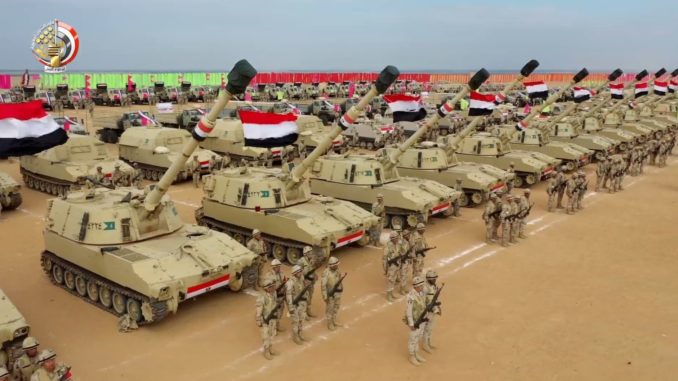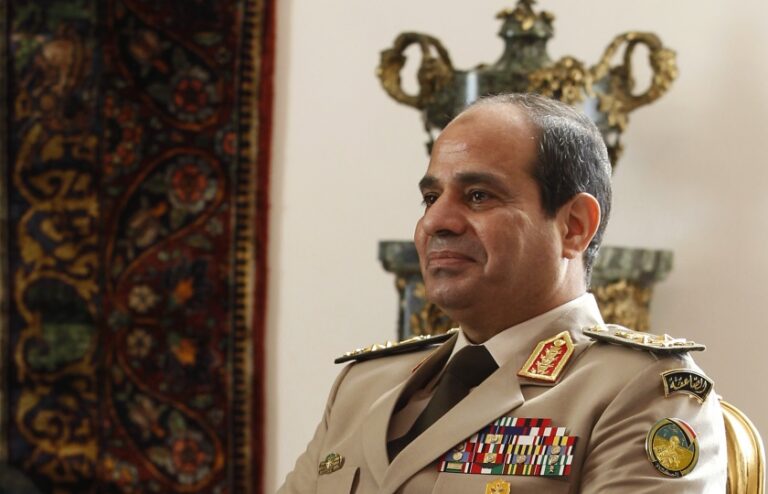US President Donald Trump’s accusation of the Egyptian regime of spending American aid money on the purchase of weapons from Russia has sparked significant controversy in Egypt and the United States of America. Although Egyptian and American experts denied the validity of Trump’s statements and emphasized their impossibility, Trump’s remarks drew attention to the Egyptian military spending, especially in light of the vast army deals concluded by the Egyptian regime.
Over the past few years, the Egyptian regime has stepped up its massive arms deals with France, Italy, Germany, Russia, the United States, and other countries. Despite these deals, official Egyptian data claimed that general Egyptian military spending recorded 1.2% of GDP, while the average military spending in the region’s countries reached 4.4% of GDP.
Official data said that the average Egyptian military spending amounted to $ 3.8 billion between 2010-2019, making it one of the lowest countries in the Middle East and North Africa region, including 14 countries for which data are available. In fact, the declared military spending is not commensurate with the size and level of the Egyptian Armed Forces’ armament, as the largest army in the Middle East and North Africa region, and the second after Iran, in terms of the number of its personnel (439,000).
According to official budgets, the average Egyptian military spending declined annually between 2010-2019 than in the period between 2000-2009. Indeed, real military spending (excluding inflation factors) began to decrease starting from the fiscal year 2015-2016. Despite the fact that the last ten years witnessed Egypt’s concluding many huge arms deals compared to the previous decade. Last October, the Stockholm International Peace Research Institute released a paper entitled “Understanding Egyptian Military Expenditure,” in which it referred to what it said were “gaps in the Egyptian government announced data” on military spending.
The report emphasized that the announced Egyptian official data are not in line with the size of the Egyptian army and its armament level, especially in recent years. The report indicated that the period between 2010-2019, in which the average annual military spending is supposed to have declined according to official data, witnessed a remarkable increase in Egypt’s arms purchases compared to the previous period (between 2000-2009), which is the same period that witnessed Several military operations in Sinai. According to the report, the period during which Egypt was supposed to reduce its average military spending witnessed massive investment in its armed forces, as between 2015-2019, it became the third-largest importer of weapons in the world.
This spending places Egypt as the second-largest importer in the Middle East and North Africa, after Saudi Arabia, whose military spending exceeds 17 times Egyptian military spending, and before Algeria, whose military spending is three times the size of Egyptian military spending. The report indicated that Egypt concluded in 2019 three deals to buy weapons from Italy ($ 1 billion), Russia ($ 2 billion), and Germany ($ 2.6 billion). In 2020, it signed one deal, while negotiations are still underway on three others, with Italy worth $ 10 billion. According to the report, the peak of the number of deals concluded in that period was in the years 2014-2015, with ten deals (2014), then 16 deals (2015). Another aspect that reveals the evident gap in the official data is wages. For example, the Egyptian regime issued successive decisions to remarkably increase military and senior officers’ salaries.
Observers say that the size of official military spending in government data does not reflect in any way the size of the real army spending and huge arms deals. Economists explained that gap to “Egypt Watch” that the Egyptian army owns multiple companies monopolizing many Egyptian economy areas. Companies owned by the Egyptian military are not subject to monitoring, and their data are not included in the official Egyptian budget.
The Egyptian army also controls large land areas and establishes giant commercial, tourism, and agricultural projects on it, and recruits are used in these projects at low wages. When some of these vast lands are included in the urban space, the army sells them for huge profits.
Observers point to the Egyptian army’s role in the economy and the volume of revenues and the “unknown” income of its economic entities, stressing that these companies’ profits contribute to covering military spending, which makes the real volume of resources absorbed by military spending secretly. Besides, opponents accused the Egyptian regime’s supporters (Saudi Arabia and the UAE in particular) of financing arms deals for the Egyptian army following the military coup’s implementation in 2013. This external support complicates the possibility of knowing the size of the military spending in Egypt, which was used by the Egyptian regime after the military coup in 2013 to create its international legitimacy and build international relations based on huge arms deals.





Recent Comments